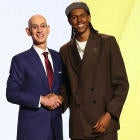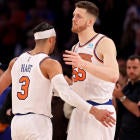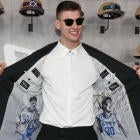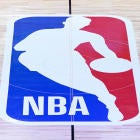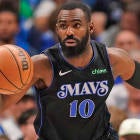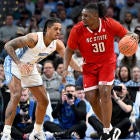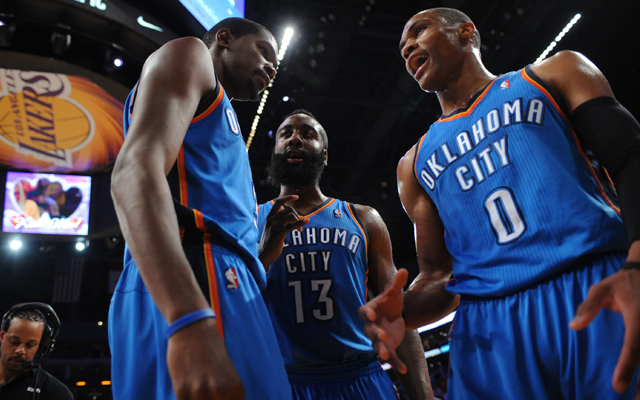 |
| Kevin Durant is a young man in a veteran's leadership role. (Getty Images) |
Training camp and preseason is where a team begins to try and establish who they are collectively. Who fills what role, both on and off the court. Part of that is establishing not only where leadership will come from, but how it will manifest itself. Kobe Bryant, in a spat with former teammate Smush Parker (really, Kobe?!) said this week on Facebook that there are times when you have to be a villain to your team in order to push them as far as you need to. Kevin Garnett talked about his role in mentoring Jared Sullinger and supporting him, this from a guy who is notorious for breaking down those who Garnett doesn't feel are strong enough to survive.
So how does leadership manifest itself? What happens on young teams? How do older players adapt to younger rosters, like Garnett with the Celtics? And how do you pick your spots with when to be harsh on teammates?
------------------------------------------------
Young At Heart, by Royce Young
OKLAHOMA CITY -- The Oklahoma City Thunder made a strange trade this offseason. They traded nearly 40 combined seasons of experience for fewer than five. Gone are Derek Fisher (16 seasons, five championships), Nazr Mohammed (14 seasons, one championship) and Royal Ivey (eight seasons) and in come young players like Hasheem Thabeet (three seasons), Perry Jones III (zero seasons) and a yet-to-be-determined 15th roster spot guy.
Despite their core aging another year, the Thunder have actually gotten younger on paper. There are still some older players with seasoned experience like Kendrick Perkins and Nick Collison, but for the most part, the leadership of the team has been turned almost entirely over to Kevin Durant , James Harden and Russell Westbrook.
"Most definitely, [I always want] to come back more of a vocal leader," Durant said. "Each year I've grown in that area, just being more of a vocal leader and also leading by example. There are going to be times I have bad games, there are going to be times I don't feel like talking to anybody or I'm going to feel upset, but that's part of a season, that's part of going through a process. I just have to bring it every single day as far as trying to help my team."
It's a question though: Does age matter in leadership? Obviously with a guy like Fisher, there's a level of respect simply based on who he is and what he's accomplished. But players like Mohammed and Ivey were sparingly used. Their voices didn't especially ring out in huddles or in the locker room. The team has always belonged to Durant, Harden and Westbrook, but their youth and lack of deep NBA experience kind of limited them. It's one thing to be a leader, but it's another to need someone to lead you.
But after three consecutive seasons in the playoffs, including two conference finals trips and a loss in the NBA Finals, it seems that the Thunder's young players have built up enough leadership equity. Enough that general manager Sam Presti and coach Scott Brooks feel that the Thunder kids can be their own leaders now.
"I'm very excited about the young guys we have on this team," Durant said. "And I'm very excited to step into that role of a leader and just like those guys helped me out, I'm willing to help the younger guys out."
How does transitioning from being a leader to being the leader manifest itself? Part of it is awareness of your teammates, their attitude and how your demeanor impacts them.
"It's just more than myself and how I carry myself," said Durant. "There may be times I'm upset at myself I walk back to the bench I'm a little down, but I can't let my teammates see me that way. Because they're always looking at me. I think if I'm positive and energetic and always wanting to win, they're going to follow."
When we think of leadership in the NBA, guys with championship rings or double-digit seasons come to mind. You're not often going to look at guys that are 24 years old or younger. But the Thunder aren't your typical group of kids. They've been through the playoff ringer. They've had a wealth of experiences the past three seasons. They've gone from terrible to very, very good.
In Oklahoma City, when it comes to veteran leadership, age is just a number.
------------------------------------------------
Picking Your Spots, by Zach Harper
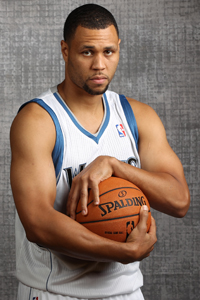 |
| Brandon Roy is in a new role in Minnesota. (Getty Images) |
MINNEAPOLIS-- A year ago, it looked like the Minnesota Timberwolves were trying to become the new Oklahoma City Thunder. They had been acquiring and stockpiling young assets, hoping to develop them and have them grow into a winning unit.
When Ricky Rubio’s knee exploded, Nikola Pekovic battled bone spurs and Kevin Love had a concussion, the season completely fell apart. It exposed the younger guys on the team for not being serious enough about winning and buying into the game plan. At the Wolves’ Media Day at the beginning of this month, Love accused some guys of not battling to play in the post season.
“I’m not saying our locker room was divided that last season, but for some guys they had a date circled on their calendar,” Love explained the day before training camp started. “It wasn’t the one that said this is going to be our first day of the playoffs; it was ‘Oh, this is the day I get to go home.’ I don’t think we have any guys on our team like that this year.
Minnesota’s coaching staff and front office wanted to gut the team of its malaise this past offseason. They shipped out Darko Milicic, Wes Johnson, and Michael Beasley. They added veterans like Andrei Kirilenko and Brandon Roy, along with younger guys like Dante Cunningham, Chase Budinger, Alexey Shved, and Greg Stiemsma who would be willing to fight for their playing time.
In bringing in someone like Roy, a former franchise player who would have to accept a lesser role in his comeback to the NBA, the transition from being a leader to being a role player could be tough if you don’t have the right mind set. Luckily for the Wolves, he is saying the right things at the moment.
“We’ve got a really, really good group. I think on this team we’ve got a number of guys that want to win and be a part of something, “Roy said after the Wolves’ preseason win over Maccabi Haifa. “So for me, no, I don’t want to step in like, ‘hey hey hey, it’s my voice,’ but slowly try to say some things.”
For some veteran leaders, it’s more important to show leadership on the court before they preach it in the locker room.
“Try to show more on the court and then start talking more as the season goes on. “
Right now, Kevin Love is the leader of this team, even when he’s out with an injury. He spoke out against teammates not playing hard toward the end of last season and has never feared speaking his mind. But while pushing his own players has been something fans have embraced, his criticism of management right before free agency has been an awkward moment of telling it like it is.
When Love mentioned the Wolves needed to make the playoffs or he didn’t know how things would end up, it was a mere days before free agency lifted its moratorium and his team was entrenched in an uphill battle of negotiations with a hostile Portland front office. They were trying to get Nicolas Batum without mortgaging the future of the club, and some (including myself) viewed Love’s comments as poorly timed because it took away leverage in any negotiations.
Love is still growing into the leadership role, and perhaps that is why bringing in veterans to surround him was important. If they all come together and follow Love’s lead, it shows the younger players how to persevere when the low moments come.
“Right now, it’s good, “Roy explained. “But it’s maybe when you lose two in a row, that’s when the real leadership shows up.”
------------------------------------------------
No Quarter Given, by Matt Moore
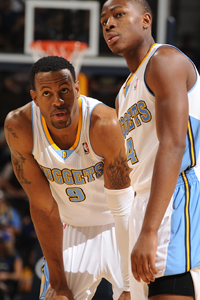 |
| Iguodala says timing is everything. (Getty Images) |
DENVER -- When it comes to being supportive, Kobe Bryant has never had that reputation. It doesn't take a lot of Googling to find former teammates on and off the record talking about Bryant's approach to team chemistry. He's a no-nonsense killer, and demands nothing less than everything a teammate can give, and if that's not good enough, he needs to give more. Bryant doesn't care about how he's perceived, how he's regarded, the friends he makes or doesn't make, or the consequences on chemistry of that approach. Bryant asks for no quarter from teammates, and none is given.
Is that the best approach though? Bryant's hardly alone in this approach. Coaches and teammates have taken this tactic through the year to mixed results. What's the general consensus, outside of the context of Bryant and his approach, for how far to go with demands for teammates? Specifically, I asked All-Star Andre Iguodala, on a new team in Denver, if there are times when you have to be brutally aggressive with teammates to draw what you need from them.
"I think you gotta pick and choose when you do it," Iguodala said. I think there is a need for it at time. The hardest thing about it is figuring out when you can do it, though. You can't be down on your teammates all the time. I think there's a time and place for that, though."
Maybe moderation is the key. Former All-Star David Lee of the Warriors, a captain on the club, says that there has to be balance when it comes to the approach:
"I definitely think there's a balance," Lee said this week, "and I definitely think there are different ways you have to approach different guys. We have six or seven guys that first or second year players, and there are guys who if you yell at them in a huddle, it's going to motivate them to say 'I got it, I got it' and they're going to respond to that. And there are guys who you have to take aside one-on-one and say 'Hey, on the next play, you didn't make a bad play but you need to look at also look at doing this (other thing)"'and kind of let them down softly.
There's different ways to approach guys and I think there's a balance, but I agree that it's not always about being best friends with a guy. There are times when they need to hear about it and you hope that if you did, they would tell them the same thing."
The problem is that this isn't college. You're accountable to your teammates, you work together, you hope to establish a bond. But there's an inherent independence for NBA players due to the nature of the business. Players can be traded at any time, players need to win and produce all the time, and it's hard to establish the knowledge of your teammates' tendencies enough to know when to express what they need to do. It's all part of the balancing act for NBA players.








